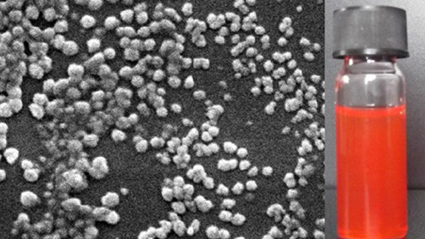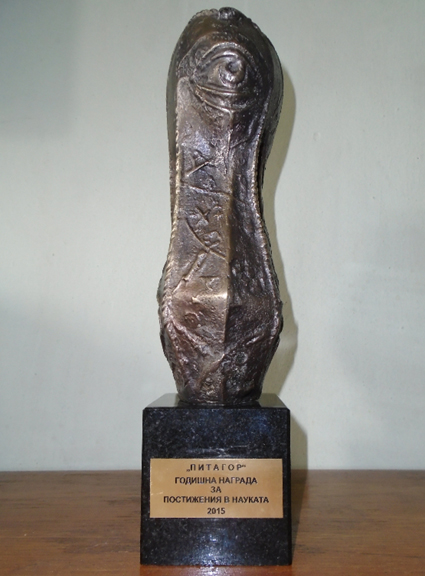The adventure called science has no beginning or end. Perhaps that was how Pythagoras himself used to think, as he was presented by the legend as a half god-half human, a wonder-maker who devoted himself to all types of mysteries. A hundred odd young Bulgarian scientists continue to follow their natural child curiosity, which makes them search for the answers of very complicated questions. Today we will introduce you to Associate-Professor Dr Georgi Yordanov who is this year's winner of the Pythagoras Prize in the Young Scientist category. The award was handed in for the seventh consecutive year by the Bulgarian Ministry of Education and Science. Georgi is a lecturer at the Faculty of Chemistry and Pharmacy at the Sofia University Saint Kliment Ohridski. He has a very impressive career behind his back for his fragile age. He wrote a series of publications in international magazines. Georgi earned high distinctions from chemistry Olympiad competitions in India and Denmark.
 “My research activities are directed in the field of Biomedical Nanotechnologies. Generally speaking, we produce nanoparticles, in order to use them in medical treatment and diagnosis. The nanoparticles are extremely small particles, a hundred times smaller than a red blood cell. Their task is to transmit medical substances. Our research is directed mainly towards the transmission of anti-cancer medical substances to the cancer cells. When the nanoparticles enter the blood system, they can reach the cancer cells, because the blood vessels in the cancer formations have openings in their walls. The normal tissue does not have such apertures and the nanoparticles can not penetrate them. In fact, the scientific field called Nanomedicine is based on this fundamental idea. ”
“My research activities are directed in the field of Biomedical Nanotechnologies. Generally speaking, we produce nanoparticles, in order to use them in medical treatment and diagnosis. The nanoparticles are extremely small particles, a hundred times smaller than a red blood cell. Their task is to transmit medical substances. Our research is directed mainly towards the transmission of anti-cancer medical substances to the cancer cells. When the nanoparticles enter the blood system, they can reach the cancer cells, because the blood vessels in the cancer formations have openings in their walls. The normal tissue does not have such apertures and the nanoparticles can not penetrate them. In fact, the scientific field called Nanomedicine is based on this fundamental idea. ”
In other words, Associate Professor Yordanov proves that thanks to nanoparticles the medical substances ca reach quickly the affected area of the human body without stratifying in other parts of the body. Thus, the side effect of the medicine is avoided, because each side effect is due to the accumulation of medical substances in healthy tissues and organs.
 The team of Associate Professor Yordanov works with material used for the manufacture of surgery glue. It is compatible with the human tissue and dissolves well inside the body. When this material enters the body, the nanoparticles do their job and then disintegrate. Bulgaria is among the few countries which produce such type of surgery glue. We also asked Associate Professor Yordanov whether receiving the Pythagoras statuette at Christ's age was a positive sign. Here is what Georgi Yordanov told Radio Bulgaria:
The team of Associate Professor Yordanov works with material used for the manufacture of surgery glue. It is compatible with the human tissue and dissolves well inside the body. When this material enters the body, the nanoparticles do their job and then disintegrate. Bulgaria is among the few countries which produce such type of surgery glue. We also asked Associate Professor Yordanov whether receiving the Pythagoras statuette at Christ's age was a positive sign. Here is what Georgi Yordanov told Radio Bulgaria:
“Yes, this a good sign. Every person has expectations and dreams. I am dreaming to finish what we started in Bulgaria. It is a very difficult task, because the scientific projects in Bulgaria are interrupted somewhere in the middle. For instance, we had a project under the Scientific Research Fund which was very well evaluated, but it was abandoned due to the lack of finance. Our main task is to complete our job to the end, despite all difficulties. I wish those who chose to walk on the road of science good luck, to have enough courage and keep their curiosity, which is the basis of science. As all chemists like to say we continue to look for the philosopher's stone", Associate Professor Yordanov said.
English version: Kostadin Atanasov
For the 30th consecutive year, the Bulgarian Posts organize a contest for the most beautiful letter to Santa Claus. Letters must be sent by 18 December with a stamped envelope "For Santa", the sender's address indicated and postage paid. All..
The Varna Regional Library "Pencho Slaveykov" has acquired a humanoid robot. It was unveiled by the library's director, Radka Kalcheva, during the celebration of the 20th anniversary of the library's American Corner, in the presence of Eric Brasel, the..
1000 participants will take part in the first Burgas Half Marathon, which will take place this Sunday, 24 November. The event will bring together amateurs and professionals of different ages who will compete in three distances - 1 km, 10.5 km and 21 km...

+359 2 9336 661
